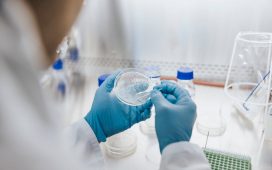The summer holidays are nearly here which would normally mean there’s never been a better time to fire up the barbeque and line it with beef burgers.
But a new study shows you might want to swap them for meat-free alternatives if you want to do your bit to save the planet.
University of Oxford experts say eating just 100g of meat per day – less than a single burger – creates four times more greenhouse gases compared with a vegan diet.
The researchers now want to see prompt policy action from government and organisations to trigger ‘dietary shifts away from animal-based foods’.
Previous studies have already suggested there are personal health benefits from ditching a meat diet, including reduced risk of heart disease.

Even low meat diets reduce environmental impact by about 30 per cent across most environmental measures compared to high meat eaters
The new study was led by experts from the Livestock, Environment and People (LEAP) project at the University of Oxford, which is working to understand the ‘health, environmental, social and economic effects of meat and dairy production’.
‘Our dietary choices have a big impact on the planet,’ said lead author Peter Scarborough, professor of population health at Oxford’s Nuffield Department of Primary Care Health Sciences and LEAP project investigator.
‘Our results, which use data from over 38,000 farms in over 100 countries, show that high meat diets have the biggest impact for many important environmental indicators, including climate change and biodiversity loss.
‘Cutting down the amount of meat and dairy in your diet can make a big difference to your dietary footprint.’
Scientists have long been vocal about the huge carbon footprint of humanity’s love for meat, fish and dairy, especially beef.
Animal agriculture contributes to global warming because of the methane, nitrous oxide and carbon emissions of livestock and their supply chains.
What’s more, deforestation to make way for space to rear cattle reduces the amount of trees that absorb carbon dioxide.
The authors stress the need for ‘changes in diets’ if we want to remain within ‘safe environmental boundaries for greenhouse gas emissions’.

Scientists are already vocal about the huge carbon footprint of humanity’s love for meat, fish and dairy, especially beef (file photo)
If these emissions get too high, the result could be rising sea levels and scorching temperatures that threaten life on Earth.
For the study, Professor Scarborough and colleagues linked dietary data from 55,504 people with data on the environmental impacts of the foods they eat.
The individuals – who filled out food frequency questionnaires – were either meat-eaters, vegetarians, vegans or pescatarians.
Meat eaters were separated into three categories depending on if they had a high-meat diet (eating over 100g of meat per day on average), medium-meat diet (between 50g and 100g) or low-meat diet (less than 50g).
For reference, a single beef burger that you might buy as part of a multipack in the supermarket is typically just over 100g each.
Dietary information was linked with food-level data on greenhouse gas emissions, land use, water use, potential biodiversity loss and the risk of ‘eutrophication’ –increased nutrients in waters due to CO2, leading to fish death.
The researchers found that the dietary impact of vegans on greenhouse gas emissions was 25 per cent of high meat-eaters.
This means eating 100g of meat per day or more on average creates four times more greenhouse gases than being vegan.

Consistently, across multiple measures such as carbon dioxide emissions (CO2e) and land use, a vegan diet was found to be the most environmentally-friendly option
Similarly, dietary impact of vegans was 25.1 per cent for land use, 46 per cent for water use, 27 per cent for eutrophication and 34 per cent for biodiversity, when compared with high meat-eaters.
Interestingly, researchers saw a 30 per cent difference between high-meat diets and low-meat diets for most of the measures of environmental harm.
This suggests that substantially reducing the amount of meat you eat can greatly help the planet, even if you’re not giving it up entirely.
However, a vegan diet was consistently found to be the best diet when it came to the multiple environmental impacts – carbon emissions, land use, water use, eutrophication potential and biodiversity.
The new study, published in the journal Nature Food, what is now a big collection of studies that have urged people to cut down on the meat they eat.
A study last found eliminating all meat from our diets over the next 15 years would slash global carbon emissions by an impressive 68 per cent.
Another said meat consumption should be slashed to the equivalent of two burgers per week to avoid a climate crisis.
Yet another British report advocated serving vegan food in schools, prisons and hospitals to increase its popularity among the general public.
Professor Scarborough and colleagues point out that the UK is now committed legally to a 78 per cent reduction in greenhouse gas emissions by 2035 compared to 1990.
Therefore, British citizens taking responsibility for reducing the amount of meat they eat could be crucial.
‘If the government is to achieve its ambitious targets for carbon reductions, then rapid progress must be made across all sectors including implementing measures to encourage consumers to shift diets,’ the team conclude.











